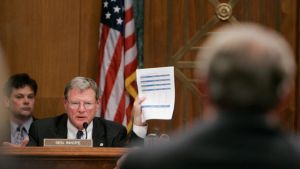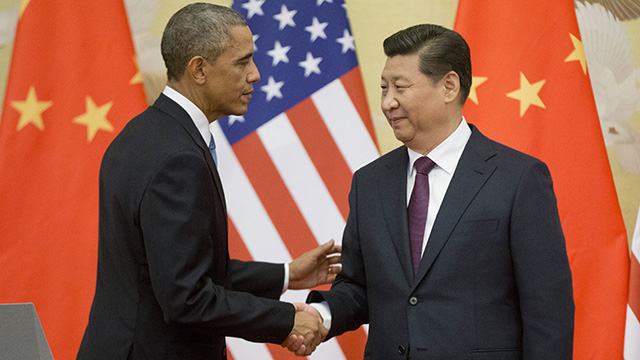We’re at an exciting moment in history. It’s looking more and more likely that, after decades of stalled and floundering negotiations, the world is on track to sign a global climate agreement. In December, at a UN summit in Paris, each of the member nations are planning to commit to reducing carbon emissions.

In 2007, Sen. James Inhofe, then the ranking Republican on the Senate Environment and Public Works Committee, held up a document while questioning former Vice President Al Gore during the committee’s hearing on global climate change on Capitol Hill in Washington. (AP Photo/Susan Walsh)
Republicans and some Democrats maintain that any global climate deal in which countries that have polluted for longer are required to cut greenhouse gases first is bogus. In recent months, Republicans have been particularly incensed by Obama’s pact with China, announced last November, in which the US agreed to reduce emissions by at least 26 percent before 2025. China will allow its emissions to peak by 2030, but in the meantime will ramp up zero-emission electricity generation (wind, solar, hydro and nuclear) by 20 percent, or 1,000 gigawatts. That’s roughly equal to all the electricity generated in the United States.

Barack Obama, left, and Chinese President Xi Jinping shake hands following the conclusion of their joint news conference at the Great Hall of the People in Beijing on Nov. 12, 2014. (AP Photo/Pablo Martinez Monsivais)
But Republicans aren’t on board. “I was particularly distressed by the deal he’s reached with the Chinese on his current trip, which, as I read the agreement, it requires the Chinese to do nothing at all for 16 years, while these carbon emission regulations are creating havoc in my state and other states across the country,” now-Senate Majority Leader Mitch McConnell said shortly after the deal was announced. It’s a straw man argument that Republicans have been using to attack the deal since it was first proposed: “The idea that China has committed to doing nothing for the next 16 years is only true if you believe that Chinese leaders are going to wake up on New Year’s Eve in 2029 and suddenly build 1,000 gigawatts of clean energy in one night,” Sen. Sheldon Whitehouse (D-RI) told Rolling Stone after Fox News pundit Charles Krauthammer made a similar claim.
If Sens. Inhofe and Blunt and their allies, are successful, it won’t be the first time the US has derailed international climate talks. In 1997, the Kyoto protocol was rendered impotent when Congress passed the Byrd-Hagel resolution, which prevented the US from signing on to any agreement in which only developed nations were required to make emissions cuts. The agreement taking shape to be signed at the December Paris meeting will need to conform to Byrd-Hagel, a fact that much of the rest of the world has reluctantly come to terms with.

Environmental activists holding flags from around the world demonstrate in front the of the conference center where the negotiation of a post Kyoto protocol deal is taking place during the UN Climate Conference in 2007 in Nusa Dua, Bali, Indonesia. (AP Photo/Binsar Bakkara)
A nonbinding agreement is clearly weaker — the only punishment for a country that fails to meet its emissions reduction goals is that it will face the rest of the world’s disapproval. Coalitions in both the developing and developed world urged the UN to design a binding agreement.
America is integral to the negotiations. Without it, the talks have little hope of accomplishing anything meaningful. And so, a nonbinding agreement it is, because the world can’t afford for another round of climate talks to collapse.
With every year that passes without the world reducing emissions, it becomes less likely that we’ll avert some of the more frightening disasters that scientists predict will come with higher degrees of warming. A recent paper published in Nature made clear that, in order to limit global warming to under 2 degrees Celsius, the threshold at which scientists predict more dangerous aspects of warming to kick in, almost all of the world’s fossil fuel reserves must be left in the ground, including 90 percent of US and Australian coal, all of the oil in the Arctic, and almost all of the oil in Alberta’s tar sands.
Meanwhile, UN officials have made clear that even with the Paris agreement that’s taking shape, the international community has not yet done enough to hit the 2 degree target. “We already know, because we have a pretty good sense of what countries will be able to do in the short run, that the sum total of efforts (in Paris) will not be able to put us on the path for two degrees,” the UN’s chief climate change diplomat, Christiana Figueres, told Reuters. “We are not going to get there with the Paris agreement … We will get there over time.”
Those senators seeking to prevent a climate agreement aren’t stupid: They know that for climate negotiators, the stakes are high because the timeline is short. Powerful interest groups hope to limit and delay action to keep climate change under control, both in America and internationally. If governments finally agree to take action — say, by putting a price on carbon — the fossil fuel lobby wants that action to go into effect very, very slowly.

Eiffel Tower in a thick smog in Paris, France, on January 6, 2015. Photo by Alain Apaydin/Sipa USA (Sipa via AP Images)
It’s a uniquely American phenomenon that politicians with anti-scientific platforms hold so much power. The Center for American Progress, a liberal think tank, recently found that the majority of Republicans in both the House and the Senate are climate change deniers (the group did not look at Democrats). Those legislators have the power to paralyze the US government when their opponents move in a direction they don’t like. Now that ability can be put to use on an international stage.
So, to strike a deal, the Obama administration and international negotiators must put themselves through contortions to avoid creating an agreement that will be destroyed by petty politics in the US. And as the months and years pass and the need to confront climate change becomes more urgent, our own polarization is making that an increasingly difficult task.
The most unfair aspect of all of this is that if no agreements are reached, America won’t be hit hardest by climate change. It’s residents of poorer countries who will bare the brunt of a more volatile world. The Associated Press recently reported that in the low-lying Sundarbans, a swampy region in India and Bangladesh, 13 million stand to be left homeless as sea levels rise and storms intensify, creating what would be the largest refugee migration in human history. And because of political squabbling halfway around the world, it’s looking increasingly likely that this tragedy, and perhaps others like it, will come to pass.



